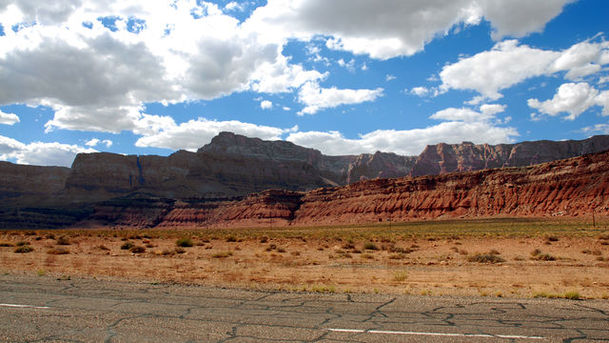Words and Music - An American Landscape

On a cold, gusting morning of January 1961 the poet Robert Frost set out to read a specially composed poem at the inauguration of John F Kennedy, the man on whom all America’s hopes were pinned. But the sun’s glare and the newness of the poem robbed Frost of his ability, his confidence, to read. He fell back on a poem he’d written in 1942. The Gift Outright explores in its few lines one of the deepest and darkest matters facing Americans: the nature of their brief relationship with the land, a land once occupied by others. The poem, read by Jeff Perry is followed by Virgil Thomson’s film score The Plow That Broke the Plains, which was sponsored by the United States Resettlement Administration. As the orchestrator of Gershwin’s Rhapsody in Blue, Ferde Grofé couldn’t have been closer to the heart of American music. In 1916, Grofé drove across the Arizona desert with a group of friends to watch the sun rise over the Grand Canyon. He was later inspired by the experience to compose his famous Grand Canyon Suite. Some years before, in the late 1860’s John Wesley Powell, a soldier turned naturalist embarked on the first geological survey of the Grand Canyon. His journal, which starts as a dry analysis of rock samples and description of geological formations finally becomes a painting and a hymn of praise to this unique American landscape. I found writer and composer speaking in one language in their breathless excitement in the presence of the Grand Canyon. I think you’ll agree that Grofé’s music and Powell’s journal exactly describe each other. Etta Baker's Appalachian guitar music is followed by Copland’s take on the same region: part of his ballet score Appalachian Spring. The White Mountains, part of the Appalachian mountains, the most rugged in New England, were visited in the 1830s by the novelist Nathaniel Hawthorne who wrote an awe-inspiring account of his trip. His connection with the area was forever sealed by his death there on a subsequent visit many years later. Copland’s classic orchestration of the Shaker hymn Simple Gifts ends this section and is itself topped off by the Mormon Tabernacle Choir’s own version of the original hymn. The composer Philip Glass has composed America with a photographer’s eye, his unique, self-styled voice, mapping America and American life and shipping it across the world as the soundtrack of numerous films. His early score to The Photographer, unswerving in its forward drive is the adjunct to Robert Lowell’s haunting poem, The Mouth of the Hudson, a description of a man standing on an outcrop above a railroad siding and watching the trains switching beneath him. It’s a neutral description until the word ‘unforgivable’ at the end. The 20th century American composer Roy Harris was born in 1898 to poor parents, in a log cabin in Oklahoma, on Abraham Lincoln's birthday. He had the perfect opportunity to survey the American landscape as he worked for many years as a trucker, criss-crossing the continent. You can hear the lie of the land in his masterpiece Symphony No.3. I mixed the symphony with John Ashbery’s poem Pyrography, an elliptical commentary of America, written to accompany a travelling exhibition of American landscape paintings. We end with Charles Ives, possibly the composer who captured the spirit of America better than any other. Whilst Harris was a trucker, Ives’s main job was in insurance. That was no bar to him writing his totally original and uncompromising musical reflection of the America he saw and heard. His Three Places in New England here prepares the way for Henry James’s reflection on the New England landscape, which I have mixed with Ives’s contemplative masterpiece The Unanswered Question. Appropriately, that piece ends the programme. Paul Frankl Producer